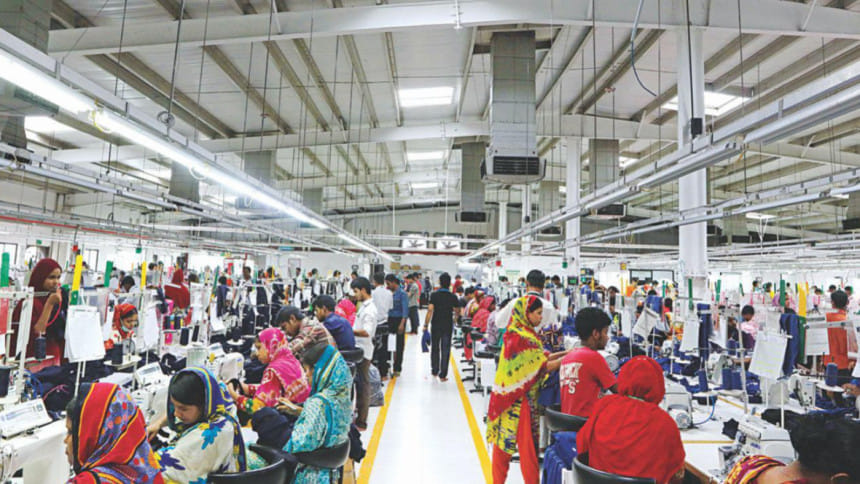Skilled workforce is RMG's future

It is well-known that the minimum wage of Bangladesh's garment workers is one of the lowest in the world, but what is less well-known and discussed far less often, is that the productivity of the sector is also the lowest among apparel producing nations, largely due to the fact that Bangladeshi workers lag behind other nations in skills and suffer from a lack of skill development opportunities and facilities.
Since its foundation, the booming Ready-Made Garment (RMG) sector has, traditionally, been regarded by foreign buyers as a value resource, based on high volume, low price products. The growth of the sector is undeniable (rising from USD 4,824 million in 2000 to USD 29,212 Million in 2017) but how do we sustain these levels and how do we prepare for changes that will arise from Bangladesh's transition from a Least Developed Country (LDC) to a developing country, with Developing Country status officially expected by 2024?
One area that should surely be considered is the encouragement of the transition of the RMG sector from the manufacture of our traditional value orientated, volume driven product, to the development of more high fashion, better quality, higher ticket price items. The benefits of adopting such an approach are obvious—a higher ticket price will generally yield a higher profit margin that, in turn, can be used to develop more upscale RMG facilities and can be used for improvements in the general well-being, standard of living and training of garment workers.
It is fair to say that the clear majority of product being produced by the Bangladesh RMG sector falls under the heading of commodity items—items that are considered basic by international buyers and, therefore, are the most subject to purchase price pressure, especially given the tough retail environment in Europe and the US (our key export destinations).
Admittedly, the volume of orders placed on these items is high, but profit margins are low, and we must consider how long we can continue to service this level of business, at a time of rising labour, raw material and resource costs (gas, electricity and water). Bangladesh had been a renowned destination for low-cost labour resource for many years, but the world map is changing, with emerging resources in Africa and Cambodia (for example) that can compete with Bangladesh in terms of labour cost and are receiving funding from both local and international governments and companies. It is time to question the established business model and, if we are going to embark on a mission to upgrade the product we produce as a nation, we need to address how we improve the skill set of our garments workers and increase the sector's productivity level.
The investment in innovation in the production process is one issue to be addressed. But it is the training and development of the RMG sector workers that I wish to highlight; to quote Steve Jobs, Co-founder of Apple, "Technology is nothing. What's important is that you have a faith in people, that they're basically good and smart, and if you give them tools, they'll do wonderful things with them." Tools in this context are not limited to the latest machinery available, but include the development of our workforce's skill sets, so that they are competent and able to produce higher grade product.
Historically our workers enter factories as trainees, at the lowest pay grade and are trained in situ at the workplace, depriving them of the opportunity to earn higher salaries and breeding a culture whereby knowledge and training are gained through a trial an error basis. Is it not time that, when hiring new workers, we not only consider a candidate's skill set and prior experience (which will largely be minimal!) but also what they can bring to the team in IQ, emotional intelligence and loyalty to the company?
This approach requires a shift in the thought process and behaviour of factory owners and their managers as it is crucial to develop lasting and meaningful relationships with the workers, to listen to them and get to understand what motivates them and their concerns and to learn what they have in mind for their own professional growth and development. This approach will not only strengthen management's relationship with the workers but will instil loyalty to the company. By allowing the talents of the workers to be developed in a considered manner, it will encourage them to attain greater levels of expertise and, eventually, become more valuable to the business as a whole.
The key to the development of any successful business is the development of a team spirit that enables all members to contribute to the best of their abilities. This is an approach that we need to adopt and nurture for the continuing success of the RMG sector.
The training of workers is not only a matter for factory owners and managers. The RMG sector contributes some 83 percent to our nation's GDP, and so is an invaluable factor in the continuing development of the country. The existing system of training facilities for garment workers provided by the government is meagre considering the value of the industry as a whole. I believe that the government and other stakeholders should make concerted efforts to invest in, and establish, much-needed networks of training facilities offering trainees the opportunity to gain the necessary skill sets and training in their chosen garment profession, without having to undergo the "trial-and-error" approach currently being practiced.
A trained workforce, with honed skill sets, will allow our industry to compete at higher market levels and, coupled with investment in technology and innovation, greatly improve overall industry efficiency.
Mostafiz Uddin is the Founder & CEO of Bangladesh Apparel Exchange (BAE) and Bangladesh Denim Expo. He is the Managing Director of Denim Expert Limited.
Email: [email protected]










Comments